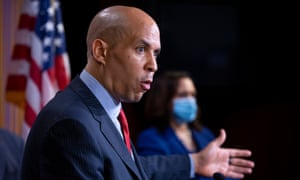- Democrats say bill is a toothless response to police brutality
- Rival reform bill expected to pass in the House this week

Photograph: Michael Reynolds/EPA
Congress was at a standstill on police reform on Wednesday after Senate Democrats successfully blocked a Republican bill they have criticized as a toothless response to police brutality.
The vote was 55-45, failing to reach the 60-vote threshold needed to advance. Two Democrats, the Alabama Senator Doug Jones and the West Virginia Senator Joe Manchin, along with Senator Angus King of Maine, an independent who caucuses with Democrats, voted with Republicans to open the debate.
A rival police reform bill put forward by Democrats is expected to pass in the House this week, but the Senate majority leader, Mitch McConnell, a Republican, has already said it would be a non-starter in the Senate.
That leaves Congress at an apparent impasse over an issue that has prompted mass protests in dozens of cities across the US since the 25 May police killing of George Floyd in Minneapolis.
In a press conference after the vote on Wednesday, Senate Democrats urged their supporters to keep up the fight for change.
“This does not mark the end of the road,” the Senate minority leader, Chuck Schumer, told reporters.
Senator Cory Booker, who helped craft the Democratic police reform bill, specifically addressed supporters, saying, “Stay at it. … Let’s keep pushing.”
But Republicans were much more pessimistic about the path forward, blaming Democrats.
“I hope that the American people see how the Democrats blocked solutions from coming to their communities for the sake of partisan politics,” said the Republican Senator Tim Scott, who led the group in charge of crafting the bill.
The Republican Senator Lindsey Graham added, “All I can say is, I don’t see a way forward.”
While common ground is not completely out of reach, such a standoff is now a familiar scene. Lawmakers have frequently failed to act during times of crisis on gun control or immigration changes despite broad support for change.
An Associated Press-NORC poll published on Monday showed Americans were largely united behind the idea that action is required, and found strong support for penalizing officers who engage in racially biased policing.
The Republicans’ Justice Act is seen by Republicans and Democrats as a starting point in the broader debate over how best to change policing practices as demonstrations in cities large and small focus on law enforcement and racial injustice. It would create a national database of police use-of-force incidents, restrict police chokeholds and set up new training procedures and commissions to study race and law enforcement.
But it is not as sweeping as a Democratic proposal, which mandates many of the changes and would hold police liable to damages in lawsuits. There are similarities on some issues, lawmakers say, but also vast differences.
The Democratic California Senator Kamala Harris said the House bill offered “concrete solutions” whereas the Republican bill was “empty” and was not “about real consequence and real accountability”.
With the Democratic bill headed for a House vote Thursday, support is growing from high-profile backers. Hundreds of celebrities, actors, musicians and industry leaders including Rihanna, RZA, Elon Musk and mayors from cities nationwide signed on to a support letter obtained by the Associated Press and being released Wednesday.
Civil rights leaders and the Congressional Black Caucus urged a no vote on the GOP bill. Law enforcement and business groups including the US Chamber of Commerce have urged both parties to find common ground.
The two bills, the House and Senate versions, would ultimately need to be the same to become law.
On Wednesday, McConnell criticized Democrats as engaging in “political nonsense”. Still, he vowed to try again, hoping to pass legislation before a 4 July holiday recess. McConnell switched his vote to no, a procedural move so he could swiftly bring it back for reconsideration.
Political risks of inaction are high, as the public wants to see policing changes after nearly a month of constant demonstrations nationwide forcing a worldwide reckoning over law enforcement and racial injustice.
Associated Press contributed to this report
Source: US Politics - theguardian.com



